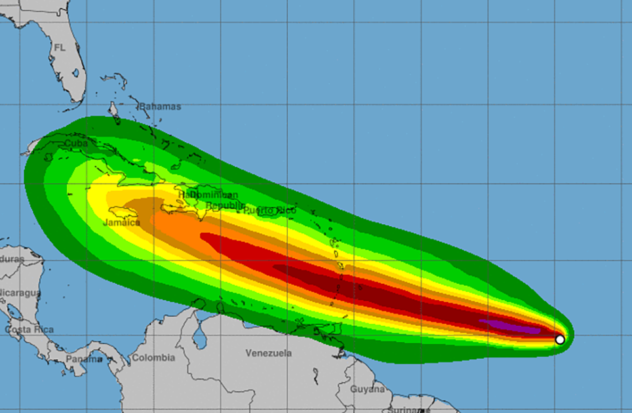MIAMI.– Tropical Storm Beryl, which formed on Friday in the Atlantic Ocean, could become the first hurricane of the year on Saturday night or in the early hours of Sunday, according to the National Hurricane Center (NHC).
Beryl was moving west on Friday with maximum sustained winds of 40 mph and pointed toward Caribbean islands, although its track was still unclear. It is still premature to establish whether it would affect the state of Florida.
The storm will be classified as a hurricane when its sustained winds reach at least 74 mph. At that time, it would become the first hurricane of the season, a statistic that is not normally recorded until August 11.
The phenomenon was located in the tropical Atlantic less than 1,000 miles east-southeast of the Windward Islands and did not pose a direct threat to any continental jurisdiction. It is estimated that the storm could affect parts of the southern Windward Islands on Monday.
Weather officials have issued a hurricane watch for Barbados and additional warnings are likely to be issued for the Windward Islands later on Saturday.
According to the NHC, Caribbean islands in Beryl’s path are likely to see tropical storm-force winds for part of Sunday, and hurricane-force winds on Sunday night or Monday morning.
Beryl is the second named storm in what is expected to be a busy Atlantic hurricane season from June 1 to November 30.
Earlier this month, Tropical Storm Alberto made landfall in northeastern Mexico with heavy rains, resulting in four deaths.
Key Hurricane Tips
- Make a plan: Every household should have a disaster plan specific to the needs of all its members, including children, pets, and seniors. Visit FloridaDisaster.org/PlanPrepare for more information.
- Prepare un kit: Identify now the essential items you may need during or after a hurricane. A kit should include enough nonperishable food and water for each family member for at least seven days, extra medications, and important personal documents. For a complete checklist, visit FloridaDisaster.org/Kit.
- Have multiple ways to receive weather alerts: Every home should have multiple ways to receive weather alerts and follow all instructions from local officials. It is recommended that you have a hand-cranked or battery-powered weather radio to ensure you can receive alerts from the National Weather Service in the event of power outages or damage to cell towers.
- Know your area, know your home: It is vital for residents to know if they live in an evacuation zone, a low-lying area prone to flooding, a mobile home, or an unsafe structure during hurricane season. It’s also important to know your home’s ability to withstand high winds and heavy rain. For more information and to determine evacuation zones, visit FloridaDisaster.org/Know.
- Keep gas tanks half full: Residents should keep their vehicles’ gas tanks at least half full during hurricane season to ensure they have enough fuel to evacuate quickly without worrying about long lines at gas stations and to avoid gas shortages before a storm. For Floridians with electric vehicles, it is recommended that the battery be kept between 50% and 80% of its capacity at all times, depending on the type of vehicle and what the vehicle’s manual recommends. Visit FloridaDisaster.org/HalfwayFull for more information.



